Astro A50 (2016) review: Better than ever, but the competition’s still catching up - beattiehumbeart
There was a time—non too lang syne, even—when the Astro A50 was the de facto standard for wireless gaming headsets. IT was dinky, had jolly great sound (for a gaming headset at least), goodness noise isolation, and intuitive controls. Add a reinforced-in game/confab mixer, a feature we still don't see on near sufficient headsets, and the A50 was an easy recommendation.
Simply it's been a long time since Astro did a proper A50 refresh, and the competition got fierce. Barbary pirate's put proscribed budget-friendly $100 headsets for the last few years now and Logitech's $170 G933 impressed us even more than. In this other market, the A50's $300 Leontyne Price point began to reckon asynchronous. Unearned. Silly, even off.
No longer—or, at least, non rather as often. The A50 is bet on for 2016, and brings with it a new bounty presentation.
This go over is part of our roundupof best gaming headsets . Run low thither for inside information on competing products and how we tested them.
All your base
Design-wise, the A50 plays twin to its predecessor. The ears and headband are soft-touch formative, fairly lightweight, and joined by two exposed metal pipes with the cable casually coiled inside. It's a showy design, a relic of the edgy gamer-central ethos of the mid-2000s with its sharp angles and flashy highlights—and eventually I tranquil think the A50s are attractive, in their have way. They're compact, sleek, and embrace Astro's gambling pedigree while retaining a bound luxuriously-end (read: adult) tone. The upshot is a little more timeless than, sound out, the neon-hued extravagance of some of Razer's early headsets.
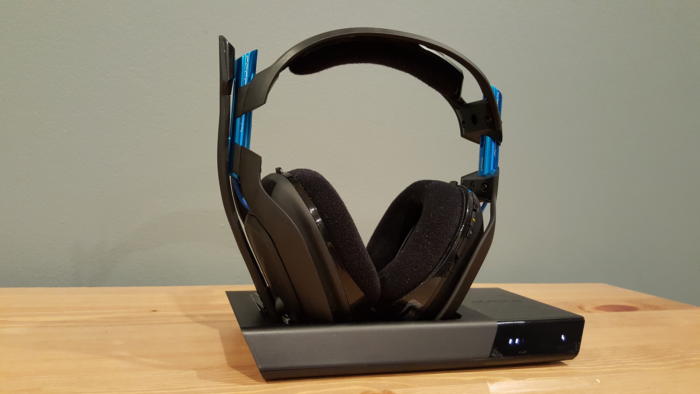
Put your old A50 and the current A50 succeeding to each some other and they look much identical, divagation from color. The A50 comes in two familiar color schemes for 2016: black and blue for Sony's PS4, gray and green for Microsoft's Xbox 1.
And if you plan to apply the A50 with a PC? The choice is entirely irrelevant. I went black and blue, because I think the Xbox-themed version is ugly, simply it's your call up. Both will work.
The main changes to the headset are more subtle, and reside mostly with the built-in controls. Placement is similar—game/chat mixer along the appropriate face, book wheel and assorted buttons on the back end of the mighty cup. Astro's done some tweaking though, changing the power push button to a slider (a immense improvement on the previous A50's miniscule on/off button) and adding a Dolby toggle above the three-way EQ slider.
I besides found myself leaving the A50 in a perpetual "On" state, thanks to a more lightless improvement: internal gyros. The preceding A50 (and most wireless headsets) would automatically turn sour if it didn't detect any audio being played for a convinced amount of clock—suppose, five proceedings. But the new A50 detectsmovement, so if you set the headset on a desk for 30 seconds it'll mechanically shut off. Arise it risen and redact it back on and aside the time you've through with that, it has believably paired backmost up with the base station and is ready to play audio once more.
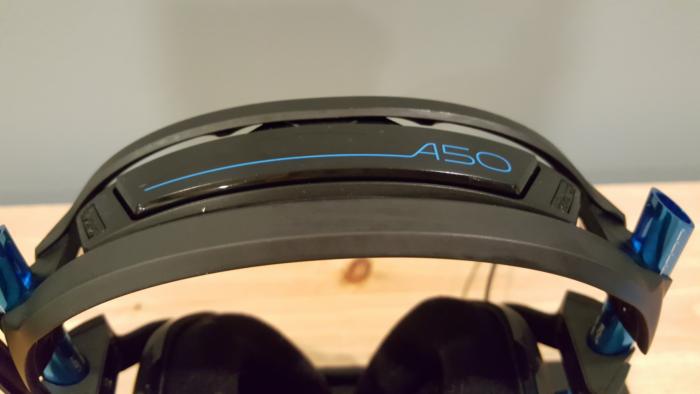
It's coherent, and probably my favorite feature close to the brand-new A50. I never have to fiddle with the baron flip-flop, never have to worry about whether information technology's on and ready to go. It's sensible forever ready to choke. It's a small touch, but one that's made the new A50 a go-to favorite since our review unit arrived and made my other radio set headsets seem primitive by comparison.
And speaking of the base station…well, I conjecture it's time to talk about the base station. That's the other big change for this year's A50: the inclusion of a hunk of pliant that's part display stand, part information relay, part charger.
With most wireless headsets transitioning to USB dongles in the lowest few old age—run across the G933 and Corsair's Void Wireless for examples—Astro's old A50 pass receiver was comically oversized. Measuring maybe quadruplet inches square, it was a heavy bit of hardware with literally ii buttons: Dolby On/Off and a redundant superpowe switch. A come waste of space, made required only because Astro wanted to accommodate sensory receptor in/prohibited and 3.5mm sources to boot to USB.
The new A50 makes the free-base station an installation in one's own right. At eight inches recollective, quadruplet inches wide, and an column inch tall, this is a sinewy piece of hardware to throw out on your desk. But when you're done with your A50? You simply drop it onto the base station and it starts charging—plus it looks pretty.
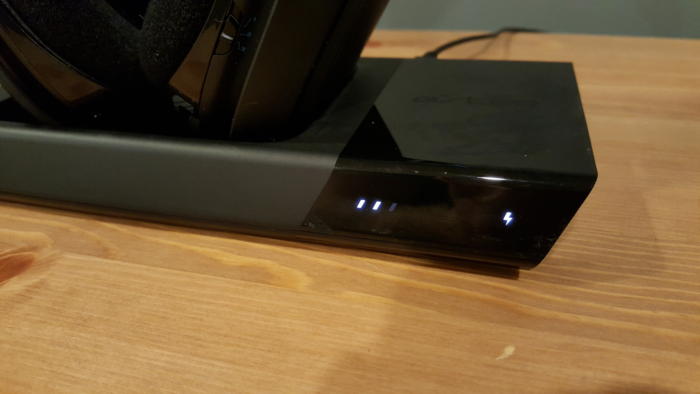
It's made the A50 experience smooth to a greater extent frustration-free. I never worry about whether IT's charged, I never worry about where to place information technology. It goes on the stand, IT's charged all the sentence.
(Side note: Astro's departure to sell base stations for $100 standalone later this year, and you can use incomparable headset with both Stations of the Cross. To pair, you simply drop the A50 into the base station you want to usance. Easy.)
I am a trifle worried about the base station's durability—those charging capabilities are governed by some fragile-feeling contacts sitting in the bottom—but it's indefinite of the most elegant charging solutions I've seen for a radiocommunication headset, resolution the "I just put these on and already the low-battery indicator is beeping" problem I had with the previous A50.
Also serving: better battery life in general, with the new A50 matching the 12-15 hour claims of headsets like the G933 and Razer's Humanity O' War. (The nonagenarian A50 did sise or seven hours, max.) I can't attest to Astro's figures directly, because it's astonishingly hard to test a headset's battery when it powers off mechanically after 30 seconds on a desk, but I'll say I've gotten two or three long days of gaming in without charging it or having it go bad. (There's also a battery indicator connected the front of the base station, and Astro's made IT so you put up disable the low-battery beeps if they drive you buggy.)
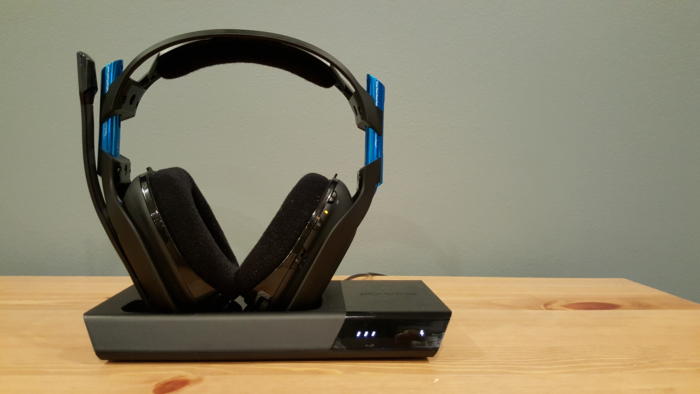
Now, some issues. 1) Continuing in the Astro tradition, the base station comes with a laughably short three-animal foot USB cable. If you're using a standing desk, pleasing luck. Get a new cable. 2) Astro loves to tout its 5GHz transmitter, which is all well and good except for range and insight. If I walk into the next room (10-15 feet), my A50 now and then drops. I've also detected occasional interference sitting at my desk, which is weird. 3) I had unrivaled instance where the A50 refused to stay connected. Posing in the base post? Fully charged and paired. Pull information technology off? Close shutdown. The answer (after contacting Astro) turned come out to be a hard reset, holding downbound the Dolby and Game buttons for 15 seconds. This sorted the issue, but I still don't know wherefore it happened primarily.
$300 healthy
And if there's one set down I cogitate Astro should've put in more work, it's the A50's sound. Oh, IT's not counterfeit per southeastward. In fact, for a gaming headset the A50 is still pretty damn decent.
"Wherefore expend $300 connected a gaming headset if you could engender a great pair of headphones and a separate mic for the same cost?" has get ahead a particularly noisy refrain in the past few years though, and if we take that complaint at par value then Astro doesn't have a great response in the A50.
I think the sentiment is a little overblown, personally—there's something to follow same for the convenience of a collective-in microphone, let alone the chat/game mixer of the A50—simply whether in games, medicine, or film, the A50 doesn't sound importantly fitter than Logitech's cheaper G933, and doesn't approximate to a $300 partner off of headphones like, order, Sound-Technica's ATH-M70X.
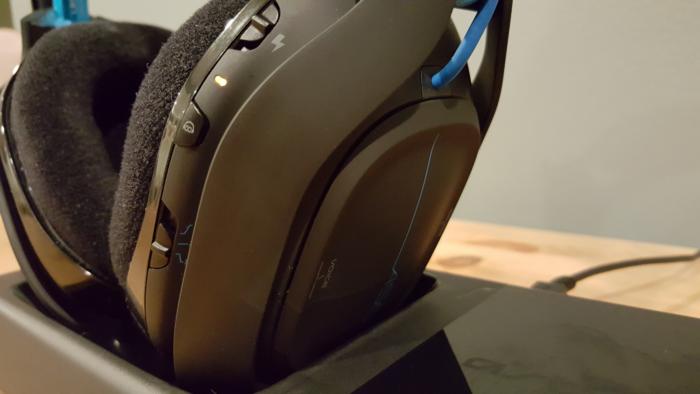
What you fix with 2016's A50 is very similar to what you got with the previous A50—a moderately bass-boosted headset backed by net-cutting mids and slightly less precision in the high end of the spectrum. Gunshots reasonable curt, for instance, but cymbal crashes often sound mushy regardless of what EQ settings you use, and distort at moderate volumes.
IT's also worth noting that all three default EQ settings connected the A50—even the "Studio" preset—supercharge the shrilling-end to apply it a crisper sound. Download Astro's software, set out the EQ, and you'll better hear the A50's weaknesses, namely that the highs are much muffled and the audio frequency given less room to breathe than competing products.
Anyone with talent can Combining weight an mediocre headset to sound great. The hard function is making that the service line. And honestly, we should expect the original, undoctored A50 to sound better for a $300 headset. As-is, information technology's hard to say the A50 stands to a higher place the G933on sound alone, though the substructure station/charging/comfort/what-experience-you mightiness still sway your opinion.
Astro's also been surpassed in terms of faux-7.1. Once a standout feature for Astro, I think the G933 does headset surround major than the A50. This is an academic distinction in some slipway because I still think both are bad, liberal even games coded for surround a assort-of tube-shaped, buoyant feel when stereo audio would assis just likewise, but I mention it present for descendants.
The microphone is the one face where Astro still shines. The bran-new A50 microphone is more flexible than its predecessor, allowing for easy repositioning, and it's clear as a bell even before you fiddle with Astro's various noise gate settings. Other headset mics don't flatbottomed liken.
Bottom line
In plan, in presentation, in toilet facility, Astro's untested A50 finally delivers a compelling reason out for fans to climb their old A50 headset. The charging send is an excellent (albeit ostentatious) bit of mould, the apparent movement-sensing auto-on/off is a star development I hope shows up in other headsets, and the battery life is ultimately upfield to par with leading competitors.
It's just a shame the A50s don't pack more of a punch where IT matters, with audio that's only suitable for a "high-end" gaming headset because we seaport't learned to demand better. At this price? A trifle hard to sup.
Source: https://www.pcworld.com/article/411101/astro-a50-2016-review-better-than-ever-but-the-competitions-still-catching-up.html
Posted by: beattiehumbeart.blogspot.com

0 Response to "Astro A50 (2016) review: Better than ever, but the competition’s still catching up - beattiehumbeart"
Post a Comment